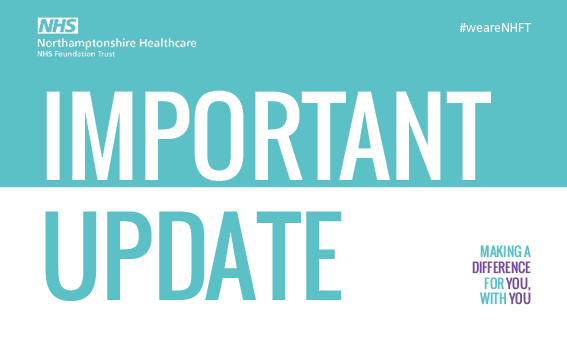Update: East Midlands Ambulance Service (EMAS) industrial action and FAQs

You may notice activity involving ambulance staff, as industrial action takes place from 6am on Wednesday 21 December until 6am on Thursday 22 December.
It is likely that 999 call handlers will be very busy and NHS 111 call centres will have fewer staff. Longer call response times are expected across the system. As a result, we are urging anyone with non-urgent care needs to first seek medical help from NHS 111 online.
Patients should continue to call 999 in a medical or mental health emergency – when someone is seriously ill or injured, or their life is at risk.
If you require urgent support with mental health, please call the 24/7 Mental Health Number on 0800 448 0828 or visit www.nhft.nhs.uk/mentalhealth-number
Our Crisis Cafes, for anyone over 18 years old, will be opening earlier than usual, to provide mental health support to those in need. The Crisis Cafes opening from 9am on 20 December 2022 are Rushden, Northampton and Kettering. More information about all of our crisis cafes can be found at www.nhft.nhs.uk/crisis-cafe
As a Trust, we have plans to deal with disruptions such as industrial action and have been working in partnership with members of GMB to ensure our urgent services are prioritised.
If you have not been contacted and told otherwise, you are advised to attend appointments as planned. This includes GP appointments, which are not impacted by this industrial action.
There will be fewer ambulances on the roads during industrial action, with the NHS prioritising those with life-threatening needs. As a result, patients whose conditions are not life-threatening are unlikely to get an ambulance on strike days.
For more information about industrial action taking place at East Midlands Ambulance Service, please visit the website.
For more information on when to call 999 and when to go to A&E, you can visit the NHS UK website.
Frequently Asked Questions
What is happening?
Trade unions representing some NHS staff are in dispute with the Government over the 2022/23 pay award. A number of the unions have balloted their NHS members to take part in industrial action. As a result members of the RCN are striking on the 15 and 20 December, and members of the GMB, Unite and Unison (ambulance staff) are striking on 21 December and members of GMB (ambulance staff) are striking on the 28 December. The NHS wants to see a resolution as soon as possible, but pay is a matter for the Government and the trade unions.
What if I need urgent or emergency care?
When someone is seriously ill or injured and their life is at risk, you should seek emergency care in the normal way, by calling 999. Anyone who needs urgent care should use NHS111 online to be assessed and directed to the right care for them. If you do not have internet access then 111 helpline is available.
What do strikes mean for NHS services in my area?
It is likely that 999 call handlers will be very busy and NHS 111 call centres will have fewer staff. Longer call response times are expected across the system. As a result, we are urging anyone with non-urgent care needs to first seek medical help from NHS 111 online.
There will be fewer ambulances on the roads during industrial action, with the NHS prioritising those with life-threatening needs. As a result, patients whose conditions are not life-threatening are unlikely to get an ambulance on strike days.
What if I have an appointment on a strike day?
Everyone who has an appointment should attend as planned, unless your local NHS provider has contacted you to reschedule. If we have not contacted you, please attend your appointment even if your Trust is affected by strikes.
Will emergency care be affected on strike days?
Emergency care will continue to be available across all parts of the country. It is really important that in emergency and life-threatening cases - when someone is seriously ill or their life is at risk patients continue to come forward.
I have a loved one who will be a hospital inpatient on strike day – how will their care be affected?
All hospital inpatients will be informed of how their care will be impacted on a ward-by-ward basis by the staff involved in delivering their care.
Will GP services be affected on strike days?
GP services will be running as normal on strike days. Please continue to attend scheduled GP appointments. your appointment as planned.
When will I find out if my appointment is rescheduled?
The NHS will contact you if your appointment needs to be rescheduled due to strike action. This is likely to be a text, phone call or a letter and you should be offered an alternative date for your appointment. If we have not contacted you, please attend your appointment as planned.
If my appointment is rescheduled, will I be put back to the bottom of the waiting list?
Any appointments that need to be rescheduled will be done so as a priority.
Is there anything I should do now?
No, the NHS will contact you if your appointment needs to be rescheduled due to strike action.
Should I cancel my appointment on the day of strikes?
No, if we have not contacted you, please attend your appointment as planned.
What should I do if I need an ambulance?
Patients should only call 999 if seriously ill or injured, and there is risk to life. Ambulances will be dispatched where clinically appropriate. For all other health care needs support will be available through NHS111 online (if you do not have internet access then 111 helpline is available) or at your local GP or pharmacy.
What is considered an emergency?
Patients should only call 999 if seriously ill or injured, and there is risk to life. Ambulances will be dispatched where clinically appropriate.
How long will services be impacted?
The nurses strikes on 15 and 20 December will last for 12 hours and the ambulance strikes on 21 and 28 December will last for 24 hours. However patients should be aware that it may take slightly longer for services to return to normal.
How exactly will the army be supporting the NHS?
Military personnel will be supporting NHS staff in a variety of ways, including by driving ambulances. They will not be providing any medical support.
How will the military assist on emergency calls? Can they drive on blue lights?
They will be primarily focused on lower category emergency calls, for example falls, but they could be sent to higher priority cases too. If deployed to an emergency, the trained clinician can drive to the scene on blue lights, with the military driver driving to hospital under normal traffic laws. This means they will be required to observe the speed limit and stop at red lights. If there is need to transport a patient to hospital under emergency blue light conditions, then the crew will request back up.
Could RCN members still go out on strike in a trust that has no official industrial action mandated?
Action can only be taken where the employer has been notified of strike action by the union after a ballot authorising such action at that employer. It’s unlawful to take part in ‘secondary action’ (going on strike in sympathy with people who work for a different employer). Information is available here on the rights of staff around taking industrial action.
Can nurses working in a derogated area still strike?
RCN members in derogated areas can still take strike action and will be protected against dismissal. Derogations are an informal agreement between unions and employers, and are not legally enforceable.
The RCN has agreed to a number of services that will be derogated in full or to reduced level of service. The RCN have processes in place for NHS organisations to request local derogations. The staffing levels on strike days in derogated areas will be agreed at employer level.
If on the day of a strike staffing levels in derogated areas fall below the level agreed, employers will work with local RCN reps to maintain staffing to the levels agreed. This may include asking staff who are striking to return to work. It is for staff to decide if they agree to the request to return to work.
Those refusing to work in derogated services can be advised warned they risk may be committing a criminal offence if their strike action has the potential to cause patient harm, endanger human life or cause serious bodily injury and that they should seek advice from their union.
What rights do non-union staff have who take industrial action?
Non-union members who take part in legal, official industrial action at their employing organisation have the same rights as union members not to be dismissed as a result of taking action.

